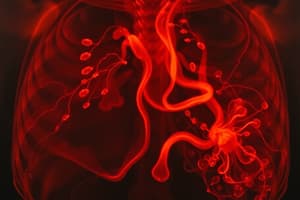Podcast
Questions and Answers
What is the most common cancer in men?
What is the most common cancer in men?
Prostate cancer
Where do most prostate cancers grow?
Where do most prostate cancers grow?
Peripheral zone of the prostate
What is the key risk factor for prostate cancer?
What is the key risk factor for prostate cancer?
Androgen hormones (e.g., testosterone)
What are some symptoms that may be associated with prostate cancer?
What are some symptoms that may be associated with prostate cancer?
What does a raised level of prostate-specific antigen (PSA) indicate?
What does a raised level of prostate-specific antigen (PSA) indicate?
How does prostate-specific antigen (PSA) help after ejaculation?
How does prostate-specific antigen (PSA) help after ejaculation?
What are the common causes of a raised PSA?
What are the common causes of a raised PSA?
How is a benign prostate described during a digital rectal examination?
How is a benign prostate described during a digital rectal examination?
What features of a prostate may indicate prostate cancer during a digital rectal examination?
What features of a prostate may indicate prostate cancer during a digital rectal examination?
What is the usual first-line investigation for suspected localised prostate cancer?
What is the usual first-line investigation for suspected localised prostate cancer?
What risk is associated with prostate biopsy if it misses the cancerous area?
What risk is associated with prostate biopsy if it misses the cancerous area?
What does the Likert scale score in the results of a multiparametric MRI of the prostate indicate?
What does the Likert scale score in the results of a multiparametric MRI of the prostate indicate?
Flashcards
Most common cancer in men?
Most common cancer in men?
Prostate cancer is the most common cancer found in men.
Location of most prostate cancers?
Location of most prostate cancers?
Most prostate cancers develop in the peripheral zone of the prostate.
Key risk factor for prostate cancer?
Key risk factor for prostate cancer?
Androgen hormones, such as testosterone, are a key risk factor for prostate cancer.
Symptoms of prostate cancer?
Symptoms of prostate cancer?
Signup and view all the flashcards
What does raised PSA indicate?
What does raised PSA indicate?
Signup and view all the flashcards
PSA's role after ejaculation?
PSA's role after ejaculation?
Signup and view all the flashcards
Common causes of a raised PSA?
Common causes of a raised PSA?
Signup and view all the flashcards
Description of a benign prostate?
Description of a benign prostate?
Signup and view all the flashcards
Features indicating prostate cancer?
Features indicating prostate cancer?
Signup and view all the flashcards
First-line investigation?
First-line investigation?
Signup and view all the flashcards
Risk of prostate biopsy?
Risk of prostate biopsy?
Signup and view all the flashcards
Likert scale indicates?
Likert scale indicates?
Signup and view all the flashcards
Study Notes
Prostate Cancer Overview
- Prostate cancer is the most common cancer found in men.
- It typically grows in the peripheral zone of the prostate gland.
Risk Factors and Symptoms
- The key risk factor for developing prostate cancer is age, with increased risk as men grow older.
- Symptoms of prostate cancer may include difficulty urinating, blood in urine, pelvic discomfort, and erectile dysfunction.
Prostate-Specific Antigen (PSA)
- A raised level of prostate-specific antigen (PSA) can indicate potential prostate issues, including prostate cancer or benign prostatic hyperplasia.
- Post-ejaculation, PSA levels may temporarily rise, reflecting the gland's activity during sexual arousal.
Causes of Raised PSA Levels
- Common causes of elevated PSA include prostate cancer, benign prostatic hyperplasia, prostatitis, and recent sexual activity.
Digital Rectal Examination (DRE)
- During a digital rectal examination, a benign prostate feels smooth and firm.
- Features indicating potential prostate cancer during DRE include hardness, irregular shape, and the presence of nodules on the prostate.
Investigations and Procedures
- The first-line investigation for suspected localized prostate cancer is a multiparametric MRI.
- A risk associated with prostate biopsies is the possibility of missing the cancerous area, leading to a false-negative result.
MRI and Likert Scale
- The Likert scale in the results of a multiparametric MRI of the prostate provides a scoring system to assess the likelihood of cancer presence based on imaging features.
Studying That Suits You
Use AI to generate personalized quizzes and flashcards to suit your learning preferences.




